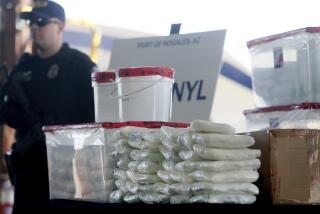White House Targets Drugs, Terrorism : Politics: Secretary of state outlines Clinton Administration foreign policy priorities. New laws, strategies pledged.
- Share via
WASHINGTON — Outlining the Clinton Administration’s foreign policy goals for the next two years, Secretary of State Warren Christopher on Friday pledged a tough new campaign against terrorists and drug traffickers to disrupt their sources of funds, close down their sanctuaries and make their entry into the United States more difficult.
In cooperation with the Justice and Treasury departments and law enforcement agencies across the country, Christopher said that his department will seek new laws, sharpen enforcement of existing statutes and apply diplomatic pressure to stop terrorists and international criminals that “sap the strength of industrialized societies and threaten the survival of emerging democracies.”
Christopher used his speech at Harvard University’s John F. Kennedy School of Government to sketch foreign policy priorities intended to appeal to the new Republican congressional leadership.
But he bluntly challenged GOP critics of the Administration’s nuclear deal with North Korea to either come up with “an effective alternative” or stop finding fault.
His address was intended to catalogue the Administration’s foreign policy plans in advance of Tuesday’s State of the Union speech by President Clinton, who is expected to concentrate on domestic issues.
Christopher said the Administration will pursue a comprehensive strategy to combat terrorism, the drug trade and other aspects of international crime.
*
In probably the most far-reaching step, the Administration intends to stop terrorists from raising money in the United States, Christopher said. Although he gave no examples, militant Islamic fundamentalist organizations, the Irish Republican Army and other groups have long relied on contributions from sympathetic Americans for much of their financial support.
The secretary said the Administration will use diplomatic pressure to induce other countries either to extradite or prosecute terrorists and other international criminals. At the same time, he said, Washington will seek international cooperation in seizing the assets of criminals and money launderers to hit them “in a vulnerable place--in their pocketbook.”
To keep terrorists and other criminals out of the United States, Christopher said, the Administration will toughen visa regulations and propose legislation to combat immigration fraud and alien-smuggling.
A senior State Department official said the Administration plans to deny visas to suspected terrorists and drug dealers, even if they have never been convicted of a crime. He said the Administration may also propose legislation making it easier for law enforcement organizations to use wiretaps.
In addition to combatting international crime, Christopher said, U.S. foreign policy will focus on four other goals, none of them new:
* Building on the momentum of recent global trade agreements to reduce still further tariffs and other trade barriers.
* Developing a post-Cold War European security structure, especially by opening North Atlantic Treaty Organization membership to Europe’s emerging democracies.
* Contributing to a comprehensive peace in the Middle East.
* Renewing the Nuclear Non-Proliferation Treaty, which expires this year, and taking other steps to combat the spread of weapons of mass destruction.
Christopher described the non-proliferation treaty as “probably one of the most important treaties of all time.” He said that its “greatest achievement is invisible--weapons not built and (nuclear) material not diverted.”
Nevertheless, renewal will not be automatic. Some Arab states have said they will not support extension of the pact unless Israel agrees to place its suspected nuclear weapons program under international inspection, a step the Israeli government refuses to take.
Some other countries object to the monopoly the treaty gives to the five nations that deployed nuclear weapons before it was enacted--the United States, the Soviet Union (now Russia), China, Britain and France.
*
Christopher declared that the Administration’s biggest success last year in limiting the spread of nuclear weapons was its framework agreement with North Korea, which he said freezes Pyongyang’s nuclear weapons program in exchange for about $4 billion in aid from the United States, Japan and South Korea.
Republican leaders on Capitol Hill have complained that the pact is too generous to North Korea’s hard-line Communist regime. But, Christopher said, the agreement is “based on verification, not trust.”
“Those who oppose the framework with North Korea have a responsibility to offer an effective alternative that protects our interests,” he said. “To this point, they certainly have not done so.”
More to Read
Get the L.A. Times Politics newsletter
Deeply reported insights into legislation, politics and policy from Sacramento, Washington and beyond. In your inbox three times per week.
You may occasionally receive promotional content from the Los Angeles Times.










